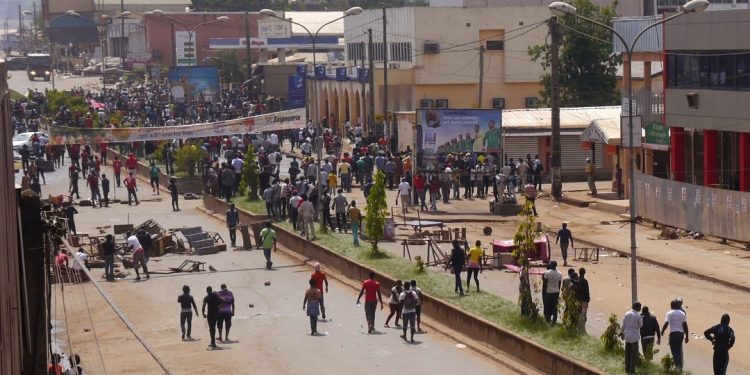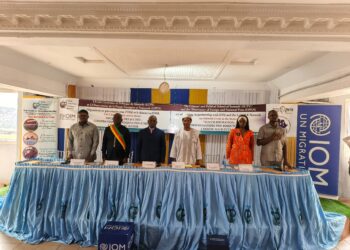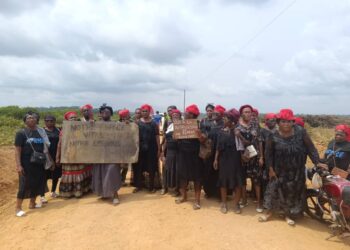Story, Louvier Kindo Tombe
Delphine was working on a border crisis report between two communities in the West region of Cameroon, when she received an email indicating that her application to attend a training workshop on conflict sensitive reporting has been granted. She saw it as an opportunity to further sharpen her skills in delivering the report. The freelance reporter, 27, was actually blocked on how to tell the story given that she was a native of one of the warring communities. She came to the training expecting to learn how to better address the crisis.
“As journalists, we are shaping conflicts for good or for bad,” says Eugene Nforngwa, from the Rainforest Center for Policy Research. He was one of the facilitators at the training workshop that held in Yaounde, political capital of Cameroon from November 8-10, 2023.
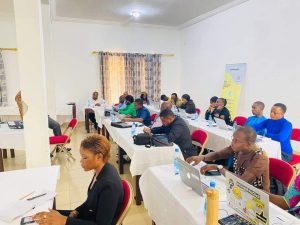
The different journalists and bloggers were told that they can’t properly report a conflict without understanding the conflict, and understanding the conflict is neccesary because stakeholders usually frame it to their favour. framing refers to the idea that actors like strategic communicators, journalists, but also audience members select some aspects of a particular issue and make them salient while other aspects are ignored.
Just after the first day of the training workshop, Delphine discovered that she has been missing the real issue in the crisis affecting her community. “Initially I thought they were fighting for land, but with the skills gained here, I now see that the real issue is the underground treasures”, she said.
Understanding a conflict is key in addressing it. Most reporters who rely on the frames provided by stakeholders, end up missing the target in reporting the conflict, and it makes it difficult to contribute in resolving or changing the narrative around the conflict.
Journalists can easily identify the causes of a conflict if the understand the conflict correctly with the right frames. Eugene Nforngwa, made it clear to the participants at the workshop that “conflicts are not usually violent”. “It is the process of resolving a conflict that can determine whether it will turn violent or not”.
A complete understanding of a conflict requires an in-depth knowledge on the different stakeholders involved. As the training continued, Delphine discovered that all the while, she has been ignorant of the fact that some elite from her community could be fanning the flames of the conflict for their personal interest. “In every conflict there are invisible beneficiaries,” the journalists and bloggers were told.
Most often, journalists and bloggers fail to distinguish between the demands and the needs of the stakeholders in a conflict. “Demands are most often different from the needs in a conflict situation,” Blaise Bebey Abong, one of the facilitators told the reporters at the workshop.
In the case of the conflict between two communities in the West region which was examined during the workshop, the demand of the communities were for their land to be rightly demarcated at the boundary, but their needs were actually benefits from the underground treasures.
The participants at the training workshop learned that every single detail about a conflict should be taken seriously by reporters. They should be able to distinguish and draw the line between what is urgent and what is important to address in a conflict. They should avoid presenting a conflict as a binary or a simplistic issue. They should avoid as much as possible biasis in their reporting. Delphine now knows that though she is from a community in conflict, “I will not allow that to blindfold me in my reports”.
Remain a journalist
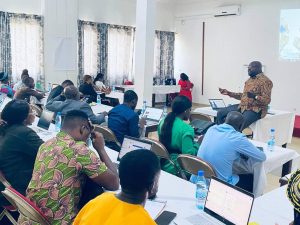
Conflict sensitive reporting is just adopting a sensitive approach in reporting the conflict by providing avenues where solutions could be easily arrived at by the different stakeholders. This means that journalists reporting conflicts should remain journalists and respect their different newsroom standards and ethics.
Ethics most often help journalists to minimize harm, act independently, be accountable and transparent among others.
Going by the popular saying “there is no hero in the grave”, the media men and women were encouraged by one of the facilitators, Franklin Sone Bayern, to always stay safe when reporting conflicts in order to tell the story at last.
“Journalists need to acknowledge the impact of their stories to a conflict, and how the conflict impacts their reporting in order to take steps to minimize risk,” Eugene Nforngwa stressed.
At the end of the workshop, the participants thanked the organizers, the Rainforest Center for Policy Research, Civic Watch Cameroon, and rOg_agency for open culture and critical transformation for the opportunity given them to sharpen their skills.
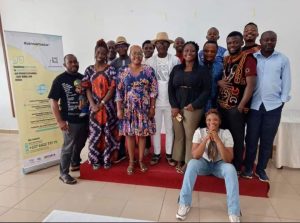
“I am leaving this workshop equipped to complete my story and I think I will contribute in the solution seeking process in my community,” Delphine told news Upfront.
A well reported story ignites hope, and opens avenues for resolution.
